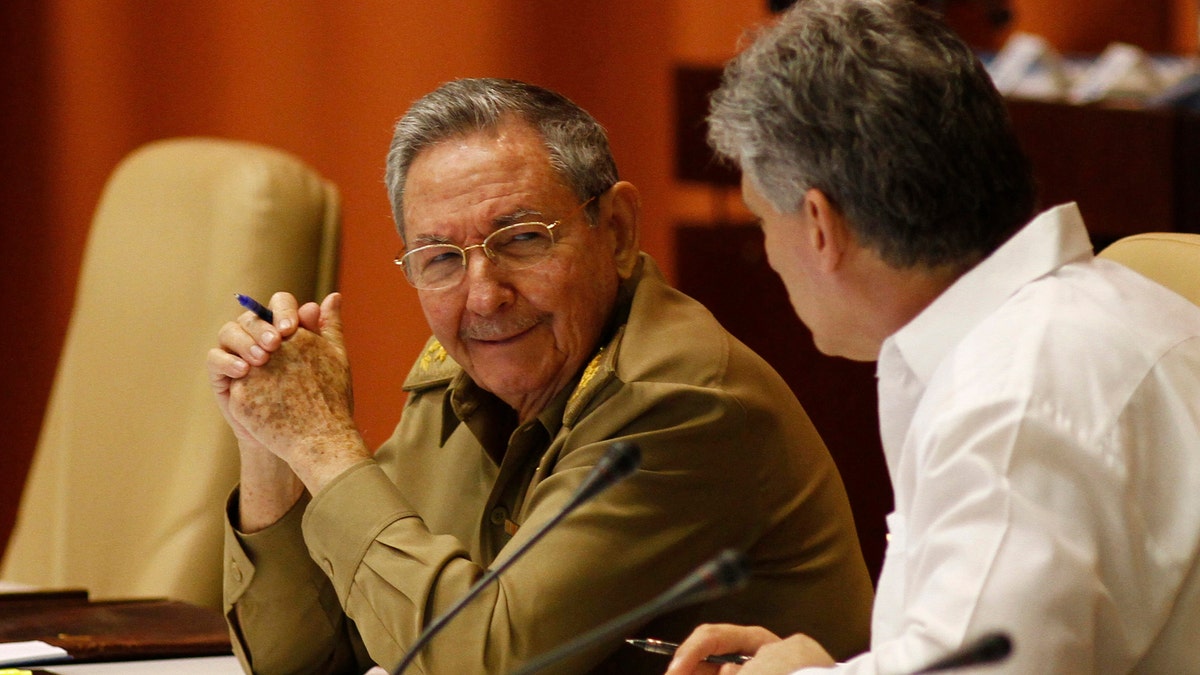
Cuba's President Raul Castro, left, and Vice President Miguel Diaz-Canel talk during the second day of a twice-annual legislative sessions, at the National Assembly in Havana, Cuba, Sunday, July 7, 2013. Observers will be watching to see if the new vice president is taking on increasing responsibility since assuming the post in what was seen as the beginning of a generational leadership transition. (AP Photo/Ismael Francisco, Cubadebate)
Speaking before legislators at one of parliament's twice-annual sessions, Raúl Castro spent the lion's share of his speech scolding his people for all kinds of bad behavior.
Calling out Cubans on everything from corruption and theft to public urination, the president railed against decaying morals, a deteriorating sense of civic responsibility and vanishing values like honor, decency and decorum.
On Sunday Castro also aired a laundry list of complaints about illegal activities that he said do the country harm: unauthorized home construction, illicit logging and slaughter of livestock and the acceptance of bribes, to name a few.
He also fulminated against baser examples of "social indiscipline": shouting and swearing in the streets, public drinking and drunk driving, dumping trash on the roadside and even people who relieve themselves in parks.
At times, the 82-year-old's speech sounded like a generational broadside against disrespectful youth who do as they please, a diatribe that could have crossed the lips of many a grandfather.
"When I meditate on these regrettable displays, it makes me think that despite the undeniable educational achievements made by the Revolution ... we have taken a step back in citizens' culture and public spirit," Castro said. "I have the bitter sensation that we are a society ever more educated, but not necessarily more enlightened."
Castro even cited children throwing rocks at cars and people showing up late to work as other examples of bad behavior.
"All this takes place right in front of our noses without inciting public condemnation and confrontation," Castro said.
"It is not acceptable to equate vulgarity with modernity, sloppiness and negligence with progress," he added. "Living in society entails, in the first place, accepting rules that preserve respect for decency and the rights of others."
The Cuban leader also spoke of the corrosive effects of official corruption, quoting his elder brother Fidel as saying such activity poses a greater risk to the Cuban Revolution's success than any outside forces.
Castro's biannual speech to parliament has sometimes been a moment to announce new initiatives, but Sunday's was short on specifics. Perhaps his most notable comment was a reiteration of the importance of doing away with Cuba's unique dual currency system.
Most citizens get paid in Cuban pesos, while a second currency, the dollar-pegged convertible peso, is used in tourism and to purchase most imported goods.
Castro told legislators that the Cuban economy is advancing "positively" even if those gains have yet to be felt by the average Cuban family.
On Saturday, Economy Minister Adel Yzquierdo reported to the body that GDP growth for the year will likely be between 2.5 and 3 percent, short of a previous forecast of 3.5 percent.
Castro also voiced support for Latin American allies' apparent willingness to grant NSA leaker Edward Snowden asylum, calling him a man persecuted for his ideals.
However Castro made no reference as to whether Cuba itself would offer him refuge or safe passage, a key issue since Snowden's simplest route to Latin America might be one of five direct flights that Russian carrier Aeroflot operates to Havana each week. From there Snowden could fly to Venezuela, Bolivia or Nicaragua, all possible destinations for him.
It is not clear whether, despite Castro's speech on Sunday, the communist-run country wants to risk torpedoing mildly improved relations with the United States by letting Snowden transit through the island.
Snowden had been booked on an Aeroflot flight to Havana two weeks ago, but did not board the plane. The flights normally pass through U.S. airspace, raising the possibility they could be intercepted.
"We support the sovereign right of .... Venezuela and all states in the region to grant asylum to those persecuted for their ideals or their struggles for democratic rights," he said in the address to Cuba's national assembly.
The 82-year-old Cuban leader said his country was aware of the kind of secretive NSA programs Snowden revealed. He said that as a longtime enemy of Washington, the Caribbean nation has been "one of the most harassed and spied-upon nations on the planet."
Snowden has been out of sight in the transit area of Moscow's main airport since he suddenly appeared there on a plane from Hong Kong two weeks ago.
Over the weekend, both Venezuela and Bolivia made asylum offers to Snowden, and Nicaragua has said it is also considering his request.
Based on reporting by The Associated Press.
Follow us on twitter.com/foxnewslatino
Like us at facebook.com/foxnewslatino
